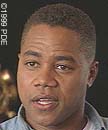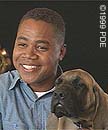Cuba Gooding, Jr.
"I know now that being negative about certain things never really gets things done. You have to stay positive. He stayed positive, and he got things done."
Cuba Gooding, Jr.

Entertainment Tonight Online goes deep with CUBA GOODING, JR. on the set of his new movie, 'Navy Diver.'
Entertainment Tonight On-line: So you have a new addition to the Gooding family?
CUBA GOODING, JR.: [laughs] Yes, yes, yes. At the end of the interview I'll reveal what it is, but we'll see how it goes and if Entertainment Tonight gets the first exclusive!
ETO: I heard about this movie a long time ago, but I had never heard of the character.
Cuba: Carl Brashear? Yeah, funny enough I hadn't heard of him either. I remember reading about how BILL COSBY had gotten a hold of the rights, and there were writers -- SCOTT SMITH . They had gotten the property and did a draft for a studio, though I don't remember which one, and they were in development on it. That was years ago. All I knew is that he was a black diver, a salvage diver in the Navy, who had lost his leg on a routine assignment, and was forced into retirement -- or almost forced into retirement, and went on to achieve master diver status. And I thought, "What a brilliant idea!" But I didn't know much about it. I didn't know how long he was in the Navy, if he was still alive. Then about a year ago they came to me with the project, and ROBERT DE NIRO was involved, playing one of the commanding officers who helps him through the ordeal. I read the script? and was totally completely away.

ETO: You've gotta feel kinda cool when it's a really heroic figure in a major zillion-dollar motion picture. There's this big star, De Niro, Cosby's executive producing, and they come to you. It's nice to get the call isn't it?
Cuba: It's really nice to get the call. Especially because the film spans -- from 1938 to 1968 -- thirty years of this guy's life. He starts off at 17, he's almost 40 at the end of the movie, so I knew it would be a character that I would need to study as far as mannerisms and how to portray the character earlier and later. So I go from 17 to 38, and because it was 1938, as a young kid Carl grew up on a farm as a sharecropper, so he had to run mules. His father worked for the guy who owned the farm, a white owner, in the South, then he went into the Navy during segregation and all these different things.

Cuba: So I was like,"So here comes a story about another African-American growing up in a time when the Jim Crowe laws were going. I don't really want to focus on the racism of the thing, but I'll read the script anyway." I thought, "Now here we go again with this story" -- even though it's a true story -- and I didn't want to make it a history lesson. Then I read it. The stuff he did -- it wouldn't have mattered if he were a white soldier -- I mean, heroic stuff. The accomplishments that Carl did in the Navy... when he dies they're going to name a battleship after him.
ETO: How do you know that? Will it be the USS Brashear?
Cuba: When you make history in the Navy, this is one of the things they do. When he lost his leg and achieved master diver status, he was the first amputee to do so. Now if I'm completely wrong, that's what I've been led to believe.
ETO: You have a visitor here.
Cuba: Oh, yeah! This here is the newest addition to the Gooding family. This is Bootsy Collings Gooding. He's an English Mastiff and they get to be 220 to 250lbs. My sons Spencer and Mason have already driven him crazy.

ETO: So you're take on this story isn't the Jackie Robinson of Navy diving, he's not breaking racial barriers.
Cuba: Well, of course there's racial tension because, let's face it, back then there was. That's what blacks in America dealt with. So we deal with that, but it's not the focus of the film. You're gonna see things that this man accomplished that you never thought any African-American did. In the Navy, he had assignments where he ran the ship. His contribution to the Armed Forces is so immense. It's really something to be proud of.
ETO: Had you signed on before you met him?
Cuba: Yes. I watched a lot of his interviews, and saw him working with his prosthetic. He lost his left leg just below the knee, and we talked about a lot of the things like the "12 steps" in the movie. One of the requirements was for him to go in front of a court room of Naval personnel, put on the Mark 5 complete suit, which weighs upward of 200 lbs., and he had to walk 12 steps.
ETO: Have you already shot that scene?
Cuba: Yeah.
ETO: What was that like?
Cuba: Really amazing. I'm not sure if I was so emotional because of what it signified or if it was because I was in the suit for 14 hours! [laughs] Two times they let me out for 40 minutes. So I didn't drink that much that day. It took them 45 minutes to get into or out of the suit. That's over an hour of break-down time, so we had to figure out some way to prop me up, take my helmet off, have my feet out on the benches, then stand me up to do the scenes.
ETO: Did you ever want to just scream, "Get me the heck out of this!"

Cuba: Oh, I'd scream all the time. It's so funny, because I went through two days of training? the first day was all classroom work, so it was kind of boring, but they tell you four things. I actually forgot two of them, but, you breathe on the way down, or you'll die. You breathe when you're ascending, or you'll die. They were always like, "If you don't do this, you will die. You'll get a brain aneurysm and you'll die."
ETO: During 'Chill Factor' I asked you if you were afraid of heights. How did you do underwater?
Cuba: I was all right. I'm proud of myself. I was down for an hour, sometimes two hours. That's pretty long to be at the bottom of the ocean, because your visibility is really low. There was one scene where I was walking on the bottom of the ocean for the first time, and they brought me down on a ladder. They had me walk away from the ladder during the scene. So I'm walking around for like ten or fifteen minutes, and topside says, "You can stay down there if you want." And I said, "Yeah, I'm fine." What had happened is that I got disoriented. So I turned around and started walking towards what I thought was the ladder, and it got darker because I was going deeper. So I said, "Okay, don't freak out. Don't say anything because you don't want them to think that the actor is being pansy." So eventually I found my hose, and followed my hose back. But for a minute, I freaked out. [laughs]
ETO: There are like ten safety divers up there, but it's still dangerous.
Cuba: It's dangerous, but it was more my ego, because the safety divers would check up every two minutes, but I don't want to tell them that I'm lost, because then they're gonna laugh at me.

ETO: So you've met Carl, but he's around all the time. Does it make you nervous playing a guy who's looking over your shoulder a little bit?
Cuba: For some of the stuff. Like I said, the movie spans out over his life. His father passes away, he loses his leg -- very emotional stuff. And if I ever got concerned it was after an emotional take, because I would look at him. He's a very straightforward man, not the type that you picture getting emotional. So after the take I'd walk up to him and he'd say, "That was good, but I don't remember getting that emotional." [laughs] But anytime I have anything technical like how to wear my hat, and how to tie a knot, I just go to him.
ETO: How are you acting to not have a leg? Did you digitally remove the leg?
Cuba: We're doing a little bit of everything. I can tell you after the movie is out how we did it. I had another advisor, Susan Zormer, who has been fantastic. She and others coach me on my mannerisms, so I think it will be very interesting to see.
ETO: You say that this is not a movie about a guy who breaks racial barriers, but in a way it is.

Cuba: It is, but let me correct you. It is a movie about a man who breaks racial barriers by example, not by lesson. This is not a movie where you'll feel uncomfortable about the racial issues. I didn't want him to come off has saying, "I'm black, and I have to deal with all this and you're being mean to me." I didn't want it to be that way because this guy got through a lot of what he did by his personality. People loved Carl and they still do. He is a wonderful, dynamic person, and that's what got him through this stuff, not harping on the fact that they wouldn't allow him to do this. He wrote over a hundred letters to Congress to get him into this school, and they kept ignoring it until it finally clicked. This guy is persistent, not dwelling on the negativity of his circumstance, but overcoming it.
ETO: Do you personally relate to him in your own life? You've been quoted on Hollywood and the way they treat black actors, interracial relationships, etc.
Cuba: Well I can attribute this next comment to Carl, and the fact that I am getting older. When I was younger I thought, "You've gotta fight the system. Everything is personally geared to your demise." Which is true to a certain degree in anything you do... if you start a business, people want to see if you're good so they put you through certain tests. I know now that being negative about certain things never really gets things done. You have to stay positive. He stayed positive, and he got things done. You can't sway someone's opinion by argument, you have to do it by example.
-- November 18, 1999
Courtesy Entertainment Online